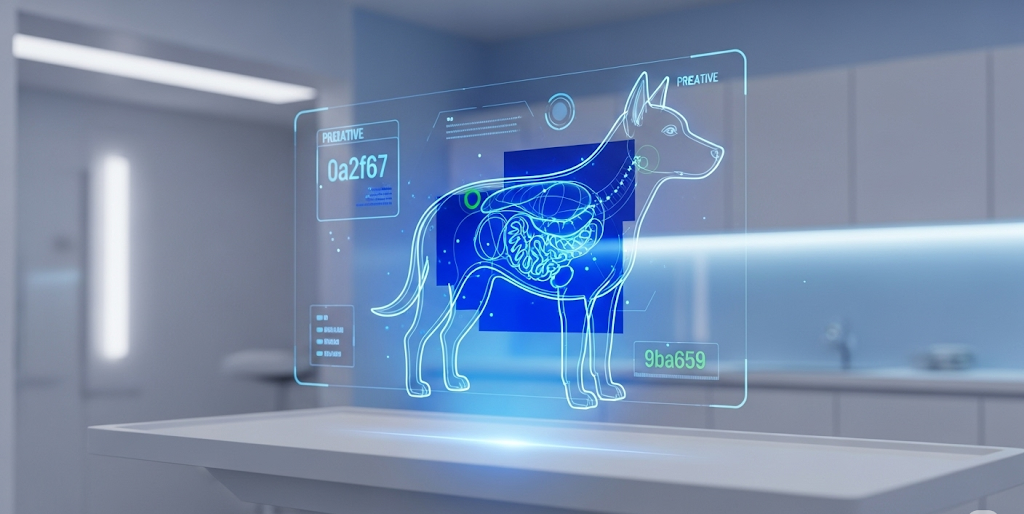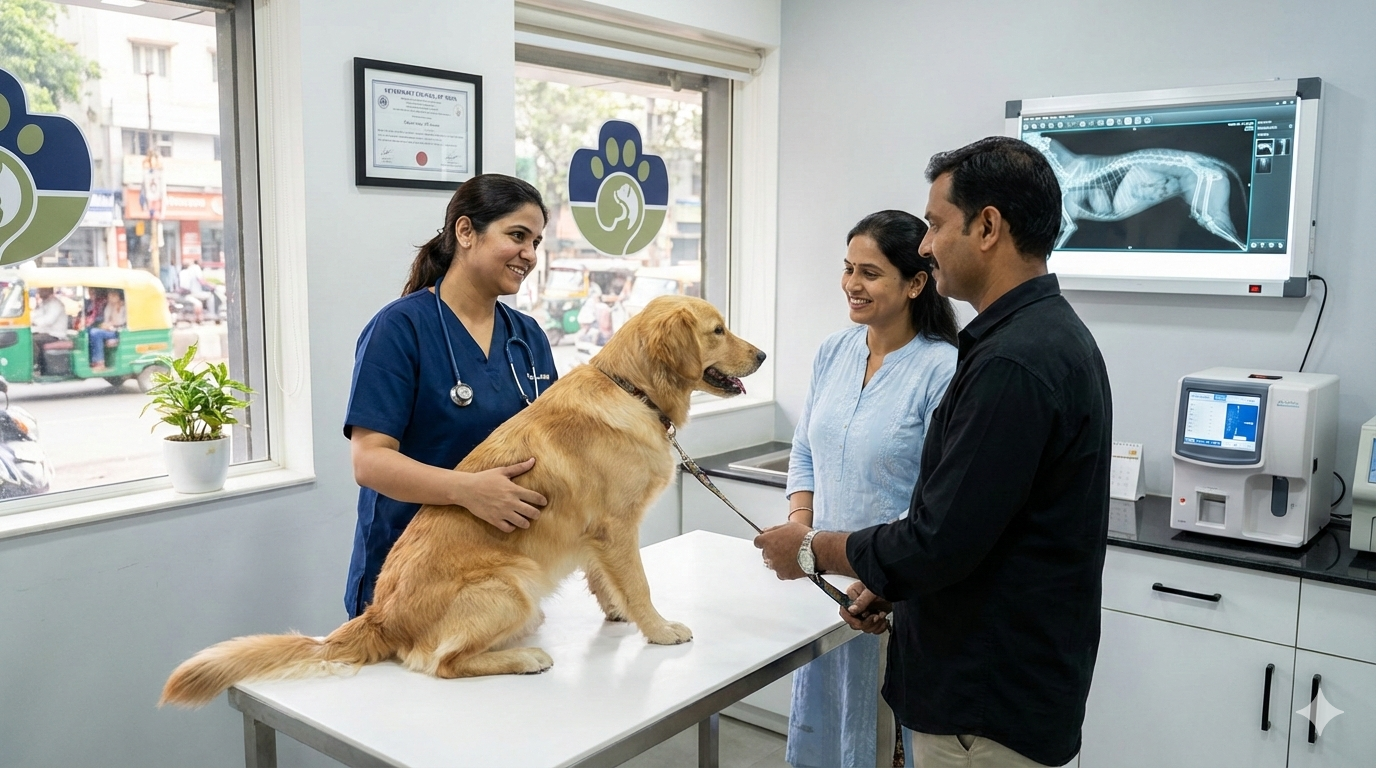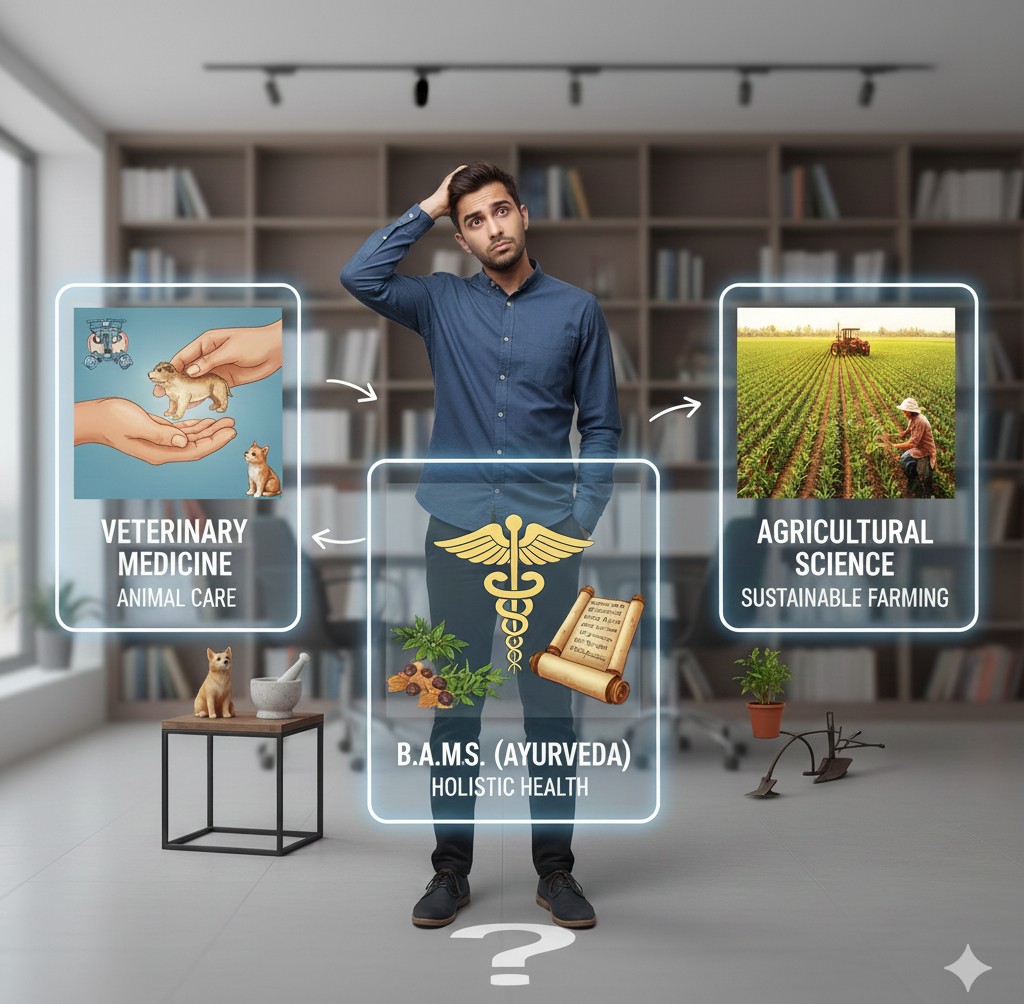The Bachelor of Veterinary Science and Animal Husbandry (BVSc & AH) degree is your gateway to a diverse and impactful career in animal health and welfare. This guide explores the various professional avenues available to graduates, with a primary focus on income potential both within India and across the globe.
The field is experiencing significant growth, driven by:
- Increasing pet ownership.
- Advancements in animal healthcare.
- A growing emphasis on food safety and public health.
The BVSc & AH program typically spans 5.5 years, including 4.5 years of academic sessions and a mandatory one-year internship. This comprehensive structure provides extensive knowledge and practical experience.
The versatility of the BVSc & AH degree is a major advantage. It opens doors to a wide array of roles beyond traditional veterinary practice, including specialized medical fields, public health, academia, and scientific research. This broadens career options, allowing graduates to align their specific interests with a viable professional path, enhancing job satisfaction and long-term career security.
Career Paths and Earning Potential in India
The veterinary landscape in India offers a spectrum of opportunities, from stable government positions to dynamic private practices and burgeoning corporate roles. Earning potential varies significantly based on sector, experience, specialization, and geographic location.
A. Government Sector: Stability and Service

This bar chart illustrates the typical starting monthly salaries for government veterinary doctors in various Indian states, showcasing the geographical impact on income.
BVSc & AH graduates can secure diverse roles within the government sector, primarily within the Animal Husbandry Department. These positions include:
- Veterinarians
- Animal surgeons
- Animal breeders
Veterinary Officers or Assistant Surgeons are crucial for:
- Livestock disease diagnosis and treatment.
- Conducting vaccination and deworming drives.
- Leading public awareness programs, particularly in rural veterinary dispensaries.
Highly respected opportunities also exist by pursuing Civil Services or UPSC examinations. Top government recruiters in this field include the CRPF Paramedical Department and the Indian Council of Medical Research (ICMR).
Government jobs offer not just job security but also a comprehensive and often highly competitive compensation package, especially when considering allowances and long-term growth into senior administrative roles. The robust total compensation package, including various allowances, substantially increases the take-home pay, making these positions financially attractive.
Salary Structure and Benefits in Government Service:
- Fresh Graduates: Monthly salaries can range from ₹40,000 to ₹80,000.
- Overall Average (Government Roles): Veterinary Doctors in government roles can earn between ₹50,000 and ₹1,00,000 per month.
- Overall Average (Fresh Graduates in India): Typically, between ₹28,000 and ₹30,000 per month.
Geographic location significantly impacts government veterinary salaries within India, with substantial variations across states. This is influenced by state economic conditions, cost of living, demand for veterinary services, and specific state pay commission structures.
- Tamil Nadu: Approximately ₹56,000 per month plus allowances.
- Rajasthan: Starting salary around ₹50,000 per month.
- Bihar: Monthly salaries can be ₹60,000-₹65,000.
- West Bengal: ₹63,000-₹68,000.
- Punjab: ₹45,000-₹50,000.
- Himachal Pradesh: Lower ranges, typically between ₹21,000 and ₹26,000 per month.
Students aspiring for government roles should research Public Service Commission (PSC) recruitment drives and associated pay scales of different states. Strategic selection of a state for employment can significantly impact their initial and long-term income.
For senior government roles, such as Chief Veterinary Officer, the earning potential can be substantially higher.
- Some profiles show annual salaries reaching up to ₹29.6 lakhs.
- The average for a Veterinary Officer is reported around ₹18.0 lakhs per year.
- A Chief Veterinary Officer in the UP Government Animal Husbandry Department can earn an average of ₹12.0 lakhs per year.
B. Private Practice: Entrepreneurship and Specialization

This bar chart shows the typical monthly salary ranges for veterinarians at different career stages in private practice, highlighting the growth with experience.
Private practice offers a dynamic career path for BVSc & AH graduates, encompassing roles as:
- Small animal practitioners.
- Large animal practitioners.
- Clinic-based vets, including those running pet clinics or engaging in dog breeding.
Salary in Private Practice:
- Entry-level Veterinarians: Typically earn between ₹25,000 and ₹40,000 per month.
- Major Metropolitan Areas (e.g., Mumbai, Bangalore): Freshers joining high-end pet clinics can expect starting salaries ranging from ₹35,000 to ₹50,000 per month.
- Mid-level Professionals (with experience): Generally see earnings rise to ₹40,000-₹70,000 per month.
Private practice offers substantial income growth potential, especially with specialization and entrepreneurial ventures.
- Senior-level Veterinarians or Clinic Owners: Can earn ₹1,00,000 or more per month.
- Experienced Vets (after 3-5 years, running own clinics): Can achieve earnings of ₹1-2 lakhs per month or even more.
Specialization also plays a crucial role in determining income:

This chart demonstrates how specializing in areas like surgery or equine medicine can significantly increase a veterinarian's monthly earning capacity in private practice.
- Small Animal Veterinarian: Might earn ₹35,000-₹75,000 per month.
- Large Animal Veterinarian: Could command ₹40,000-₹80,000 monthly.
- Equine Specialists: Often earn between ₹50,000 and ₹1,00,000 per month.
- Veterinary Surgeons: Can see salaries ranging from ₹60,000 to ₹1,20,000 per month.
Entrepreneurial Opportunities: Beyond traditional employment, BVSc & AH graduates have various entrepreneurial opportunities.
- Organic Livestock Products: The rising demand for organic milk, meat, and egg products presents a niche but promising avenue. This is driven by increasing health concerns about residues from intensive production systems.
- Veterinary students generally possess good knowledge of breeding, feeding, and healthcare management in organic livestock farming.
- A notable gap exists in their understanding of the certification process for organic products, which needs to be addressed for success in this area.
- Popular Entrepreneurial Choices: Commercial poultry farming, dairy farming, milk processing and packaging, integrated farming, and goat farming are among the popular choices for veterinary graduates.
- Internship programs for BVSc & AH students may also include entrepreneurial training.
Despite these opportunities, a significant majority of veterinary students in India (77.5%) still prioritize securing a job after graduation, with only a small percentage (11.25%) expressing interest in developing their own livestock enterprises. This preference, coupled with the annual graduation of over 3000 veterinarians and only about 1000 finding jobs in the private and public sectors, underscores the critical need for fostering an entrepreneurial mindset and developing business skills among graduates. This shift could help address potential unemployment and leverage existing market gaps.
C. Corporate Sector & NGOs: Diverse Industry Roles
The corporate sector offers an attractive alternative to traditional veterinary practice, with roles in:
- Animal health pharmaceutical companies (e.g., Zoetis, Virbac).
- Dairy farms.
- Feed production units.
Other corporate recruiters include Terzetto Pharma Metrics and Vixilanciaa.
- Freshers (Corporate): Salaries generally range from ₹35,000 to ₹60,000 per month.
- Corporate jobs often include performance-based bonuses, making them financially competitive.
- The animal feed and pharmaceutical industries are particularly noted for offering some of the best opportunities and highest pay scales , with corporate sector salaries ranging from ₹50,000 to ₹1,20,000 per month. This sector is driven by the increasing commercialization of animal health and nutrition.
Non-Governmental Organizations (NGOs) like PETA India, People for Animals, and Wildlife Trust of India also offer career paths for BVSc & AH graduates.
- While these roles require a strong passion for animal rights and welfare, often involving work in challenging situations, salaries typically range from ₹35,000 to ₹45,000 per month.
D. Academia & Research: Shaping Future Veterinarians and Advancing Science
For those inclined towards education and scientific discovery, academia and research offer fulfilling career paths. Graduates can work as:
- Professors or lecturers in universities and colleges, sharing their knowledge with future veterinarians.
- Scientists or research associates in laboratories, conducting experiments and tests related to animal well-being.
MVSc and PhD holders are particularly sought after in:
- ICAR institutes.
- Vaccine research centers.
- National livestock projects.
Pursuing postgraduate degrees (MVSc, PhD) significantly enhances earning potential and career opportunities in academia and research.
- Assistant Professor (with MVSc degree): Can expect a starting salary of ₹50,000-₹70,000 per month, based on the UGC Pay Scale.
- With PhD: Professionals become eligible for promotions to Associate and Full Professor positions.
In research and laboratory settings:
- MVSc and PhD holders: Typically earn between ₹60,000 and ₹80,000 per month, with some roles being contractual and others permanent.
- Senior Research Positions or Full Professorships (MVSc and PhD qualifications): Can command salaries ranging from ₹80,000 to ₹1,20,000+ per month.
- Overall PhD Veterinary Science Graduates (India): Can expect an average annual income of ₹2-10 lakhs.
- Specific Roles for PhD Holders:
- Veterinarian: ₹6 LPA
- Biological Scientists: ₹4.75 LPA
- Veterinary Consultant: ₹5 LPA
- Veterinary Researcher: ₹3.5 LPA
- Veterinary Technician: ₹6.5 LPA
- Graduates from prestigious institutions like the Indian Veterinary Research Institute report an average salary of ₹21.0 lakhs, with some earning between ₹22.1 lakhs and ₹24.0 lakhs based on available profiles.
Global Scope and Earning Potential
The global landscape presents significant opportunities for BVSc & AH graduates, often with substantially higher earning potential than in India. However, these opportunities come with specific requirements for international recognition and licensing.
A. International Recognition of Indian BVSc & AH Degrees
BVSc degrees awarded in India are recognized in countries like the UK and Australia. For practice in the United States, graduates from a BVSc program may be recognized if their veterinary school is accredited by the American Veterinary Medical Association (AVMA) and they pass the North American Veterinary Licensing Examination (NAVLE). In the European Union, veterinary degrees are standardized, but graduates from non-EU countries, including those with a BVSc degree, typically need to meet additional requirements, such as certification exams and further training.
Licensing Requirements by Country: Practicing abroad often requires significant additional steps, including passing licensing exams and meeting specific country-wise experience and language proficiency requirements. This highlights the importance of early career planning and understanding international regulatory frameworks for those aspiring to global careers.
USA:
- Indian graduates must generally pass the North American Veterinary Licensing Examination (NAVLE).
- If their veterinary school is not AVMA-accredited, they must successfully complete an educational equivalency certification program (e.g., AVMA's ECFVG or PAVE).
- State-specific licenses are also required for practice in each state.
UK:
- Registration with the Royal College of Veterinary Surgeons (RCVS) is mandatory.
- If the university that awarded the primary veterinary degree is not listed as recognized by the RCVS, graduates will need to pass the Statutory Membership Examination.
- English language proficiency must also be demonstrated, typically through tests like IELTS or OET.
Canada:
- Indian graduates must complete the National Examining Board (NEB) process of the Canadian Veterinary Medical Association (CVMA). This assesses whether their foreign training is equivalent to Canadian standards.
- Upon successful assessment, they obtain a Certificate of Qualification (CQ), which allows them to proceed with provincial licensing requirements.
- Proficiency in English or French is also necessary.
Australia:
- Overseas qualified veterinarians whose qualifications are not directly recognized must pass the Australasian Veterinary Examination (AVE).
- Successful completion of the AVE entitles candidates to apply for full registration with any State or Territory Veterinary Board in Australia or the Veterinary Council of New Zealand.
UAE:
- Veterinary professionals must obtain a license through the Ministry of Climate Change and Environment (MOCCAE).
- A minimum of five years of post-graduate practical experience is typically required for a full veterinary license.
- Proficiency in English or Arabic, and a clean professional and criminal record are also necessary.
- The process involves document preparation, attestation, obtaining an equivalency certificate, and passing an examination.
The Veterinary Council of India (VCI), a statutory body established under the Indian Veterinary Council Act 1984 (website: vci.dahd.gov.in), plays a crucial role in regulating veterinary practice in India. It:
- Maintains the Indian Veterinary Practitioners' Register.
- Sets standards for veterinary education.
- Advises the government on related matters. The VCI also negotiates with institutions in other countries for reciprocal recognition of veterinary qualifications.
B. Global Earning Potential
International markets offer significantly higher earning potential for BVSc & AH graduates compared to India, making global opportunities highly attractive. This substantial difference in income can be a primary driver for pursuing overseas careers. Veterinarians in countries like Canada, Australia, and the Gulf countries earn significantly more, averaging ₹2-4 lakhs per month.
There is a widespread global demand for veterinarians, particularly in developed countries like the USA, UK, Canada, and Australia, driven by increasing pet ownership and a focus on animal welfare. This high demand, coupled with existing workforce shortages, creates favorable employment prospects for qualified BVSc & AH graduates willing to meet international licensing requirements.
Here's a breakdown of average annual salaries in key regions (converted to INR at approximate exchange rates for comparison):
- USA:
- Average annual salary: Ranges from ₹60,00,000 to ₹1,20,00,000.
- Median annual salary: Around $139,999 (approximately ₹1.16 crore).
- ZipRecruiter reports an average annual pay of $165,527 (approximately ₹1.37 crore) as of May 2025, with top earners reaching $273,500 (approximately ₹2.26 crore).
- Veterinary Surgeons: Can command even higher salaries, from ₹70,00,000 to ₹1,50,00,000.
- Demand is high, with job offers jumping 124% between 2021 and 2024, and the US Bureau of Labor Statistics forecasting a 19% growth by 2033. Significant shortages exist across all sectors and specializations.
- UK:
- Average annual salaries: Typically fall between ₹50,00,000 and ₹1,00,00,000.
- Newly-qualified vets: Generally start at £32,000 to £33,600 (approximately ₹33.6-35.3 lakhs).
- With experience: Salaries can rise to £40,000-£70,000 (approximately ₹42-73.5 lakhs).
- Highly experienced vets in senior roles: Can earn £70,000-£100,000 (approximately ₹73.5 lakhs-₹1.05 crore).
- Veterinary Surgeons: Can earn ₹60,00,000-₹1,20,00,000.
- The UK veterinary profession is experiencing significant growth, with high demand for small animal, equine, farm, emergency, and public health veterinarians. Projections indicate that supply will only meet 78% of the total demand by 2035, creating substantial opportunities.
- Canada:
- Average annual salaries: Ranging from ₹40,00,000 to ₹80,00,000.
- Talent.com reports an average of $120,000 per year (approximately ₹73.2 lakhs), with entry-level positions starting at $105,000 (approximately ₹64 lakhs) and experienced professionals earning up to $137,166 (approximately ₹83.6 lakhs).
- For Indian graduates: Junior positions can pay up to $64,807 (approximately ₹39.5 lakhs), while senior roles can reach $137,500 (approximately ₹83.8 lakhs).
- Canada faces a severe shortage of veterinary professionals, with job openings expected to outnumber job seekers by 2031. Demand is particularly high in provinces like Ontario and British Columbia.
- Australia:
- Average annual salary: Approximately $135,000 (approximately ₹73.5 lakhs).
- Payscale indicates an average of AU$79,277 (approximately ₹43.2 lakhs), with entry-level professionals earning around AU$62,996 (approximately ₹34.3 lakhs) and early career professionals around AU$73,061 (approximately ₹39.8 lakhs).
- Australia is experiencing persistent shortages, with employment surging by 32.1% over the past five years. The time to fill vacancies has dramatically increased, and half of all current vacancies are open to graduates, indicating strong demand.
- The number of veterinarians is expected to grow by 19.7% by 2026.
- UAE:
- Average annual salary: Ranges from ₹30,00,000 to ₹60,00,000.
- In Dubai: Licensed veterinarians can earn between AED 120,000 and AED 360,000 annually (approximately ₹27-81 lakhs).
- In Abu Dhabi: The average monthly salary is AED 5,166 (approximately ₹1.17 lakhs), with ranges from AED 3,500 to AED 10,000 depending on experience.
- A significant advantage in the UAE is tax-free income, often complemented by housing and transportation benefits.
- The pet industry in the UAE is forecasted to grow by 500% by 2025, leading to high demand for qualified veterinarians, particularly for Western style care due to the large expatriate population.
Conclusion: A Promising Future in Veterinary Medicine
The Bachelor of Veterinary Science and Animal Husbandry (BVSc & AH) degree serves as a robust foundation for a diverse and impactful career. Graduates have a broad spectrum of professional avenues available, both within India and internationally, extending beyond traditional clinical practice to include public health, research, academia, and corporate positions.
In India, earning potential is competitive, particularly in stable government roles that offer comprehensive benefits and in private practice, where specialization can lead to significant income growth. The emerging entrepreneurial landscape, especially in areas like organic livestock farming, presents a growing niche for those with an innovative mindset.
Globally, opportunities for BVSc & AH graduates are abundant and often come with substantially higher income prospects, driven by high demand and existing workforce shortages in many developed countries. However, pursuing an international career requires meticulous planning to navigate complex licensing processes, including examinations, experience, and language proficiency requirements, which can be time-consuming and costly. Furthermore, pursuing advanced degrees such as MVSc and PhD significantly boosts career progression and earning capacity in specialized and academic roles, both domestically and internationally.
For students considering or currently pursuing a BVSc & AH degree, the future in veterinary medicine is promising. Success in this field hinges on a combination of academic excellence, practical skills, strategic career planning, continuous professional development, and adaptability to evolving market demands.
Reference
- Wise IAS. (2024). Understanding BVSc & AH Degree. wiseias.com
- Wikipedia. (1984). Veterinary Council of India. en.wikipedia.org
- MyVetJourney. (2025). Veterinary Doctor Salary in India. myvetjourney.com
- Canadian Veterinary Medical Association. Eligibility for Exams. canadianveterinarians.net
- College of Veterinarians of Ontario. Licensure Requirements. cvo.org
- Texas Board of Veterinary Medical Examiners. NAVLE for Foreign Grads. veterinary.texas.gov
- Royal College of Veterinary Surgeons. Statutory Membership Exam (UK). rcvs.org.uk
- AVBC. Veterinary Licensing in Australia & NZ. avbc.asn.au
- UAE MOCCAE. Veterinary License Process. moccae.gov.ae
- Nationwide Visas. (2024). Canada PR for Veterinarians. nationwidevisas.com
- Windmill Microlending. Using Vet Skills in Canada. windmillmicrolending.org
- AAVMC. (2022). US Veterinary Workforce Report. aavmc.org
- Reddit. (2025). Demand for Vets in Canada. reddit.com
- Swaasa. Vet Salary Guide India. swaasa.com
- PW. (2024). Veterinary Inspector Salary, BPSC. pw.live
- 6figr. Veterinary Officer Salary Data (2025). 6figr.com
- GetMyUni. PhD in Veterinary Science: Scope & Salary. getmyuni.com
- YouTube. (2025). BVSc Jobs & Salary Insights. YouTube
- ZipRecruiter. (2025). Veterinarian Salary by State (US). ziprecruiter.com
- Prospects UK. Veterinary Surgeon Job Profile. prospects.ac.uk







